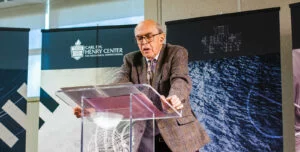On the traditional reading of the Genesis account up until Darwin, God miraculously brought the universe into being through immediate divine action. In all its astonishing diversity, the universe emerged by divine fiat.
Charles Darwin would end up toppling that old picture in one fell swoop. Not singlehandedly, of course—he had intellectual forebears and was representative of developing scientific thought. But his theory of evolution gave a persuasive account of how natural forces were able on their own to create entirely new species.Christians of all kinds found no inherent contradiction between the evolutionary account of creation and the biblical story. On his way of thinking, life’s biological diversity is the result of natural causes working on random variation—not divine intervention. Natural selection implied that nature itself could mimic a sort of intelligent design.
Even if Darwin made naturalism more intellectually credible, Christians of all kinds found no inherent contradiction between the evolutionary account of creation and the biblical story. Asa Gray, for example, was a renowned American botanist—and a pious believer—who gave a theistic interpretation of Darwin’s theory. Many other Christian thinkers, including Calvinist stalwarts like B. B. Warfield, reconciled evolution, properly limited and explained, with biblical faith.See David Livingstone, Darwin’s Forgotten Defenders: The Encounter Between Evangelical Theology and Evolutionary Thought (Grand Rapids: Eerdmans, 1987); Bradley Gundlach, Process and Providence: The Evolution Question at Princeton, 1845-1929 (Grand Rapids: Eerdmans, 2013). Indeed, prior to the rise of American fundamentalism in the early twentieth century, Christian evolutionists with orthodox beliefs were not hard to come by.
But they did struggle to find a common answer to the question of God’s relationship to the evolutionary process. Some objected that the idea of supernatural divine intervention within the evolutionary process went against the tenets of science. Others argued that God programmed all biological diversity into creation at the beginning; evolutionary development could then unfold by natural processes alone. Christian evolutionists today have inherited these questions and continue to puzzle over the most viable models.
In light of this background, we have invited five Christian evolutionists to reflect on this problem of divine action and evolution. We asked them to interact with the following question: Does evolutionary creationism allow for detectable divine intervention? As the moderator, I will offer a “Redirect” to the five responses—the Redirect is a single commentary that will raise questions prompted by the responses.This idea is inspired by the helpful format in Kenneth Keathley, J. B. Stump, and Joe Aguirre, eds., Old Earth or Evolutionary Creation? Discussing Origins with Reasons to Believe and BioLogos (Downers Grove: InterVarsity, 2017). The respondents will then reply to the Redirect in a second round of rejoinders; these second replies may interact solely with the Redirect or they may also engage with any of the other four original responses.
Our hope is that this exchange will advance our understanding of evolutionary creationism in interesting and illuminating ways. The five respondents are Jim Stump, Michael Behe, Niamh Middleton, Denis Alexander, and Robert Russell. I now leave this first phase of the Areopagite in their capable hands.







Comments
Be the first one to make a comment!